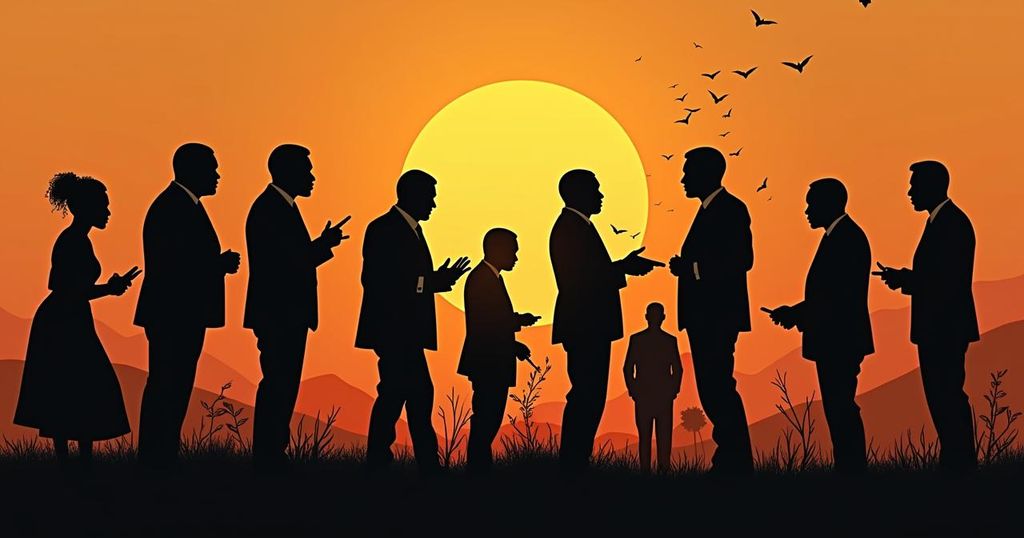Mozambique is preparing for elections that could mark the first presidency of a candidate born post-independence. With President Nyusi’s corruption-riddled administration stepping down, four candidates—Daniel Chapo, Ossufo Momade, Venancio Mondlane, and Lutero Simango—are vying for leadership. Key issues include armed conflict, unemployment, and climate resilience. As the country seeks reform, the elections are pivotal for its future direction.
On Wednesday, Mozambique is set to hold elections that may lead to the country’s first president born after its independence from Portuguese colonial rule in 1975. Approximately 17 million eligible voters from a population of 32 million will cast their ballots concurrently for presidential, parliamentary, and provincial positions. The election comes at a critical time when President Filipe Nyusi of the Mozambique Liberation Front (Frelimo) prepares to step down after eight years in office, marking a potential generational shift in leadership. President Nyusi’s tenure has been marred by significant corruption scandals, particularly the controversial “tuna bond” case, which has tainted Frelimo’s long-standing governance, leading to increased disillusionment among the populace, particularly the youth. The election features four notable presidential candidates: 1. Daniel Chapo (47) – The front-runner from Frelimo, Chapo is relatively new to politics, having risen to prominence as the party’s leader in 2024. He promises to restore peace in conflict-ridden regions and has distanced himself from the party’s corrupt past, although many young voters remain skeptical of his connection to Frelimo’s legacy. 2. Ossufo Momade (63) – Leading the opposition party Renamo, Momade represents the old guard, having participated in Mozambique’s civil conflict. He is known for his role in the peace accords of 2019 but has struggled to gain traction against Frelimo’s widespread influence. In the 2019 elections, he secured only 21 percent of the vote, alleging widespread electoral fraud. 3. Venancio Mondlane (50) – A charismatic former Renamo deputy who has garnered support primarily from younger voters, Mondlane is running as an independent backed by a coalition of various political groups. His campaign focuses on creating job opportunities and addressing violence in Cabo Delgado. 4. Lutero Simango (64) – The leader of the Democratic Movement of Mozambique (MDM), Simango emphasizes economic development and job creation in his platform, advocating for the processing of natural resources within Mozambique rather than their export. Key issues at stake include the ongoing armed conflict in Cabo Delgado, high levels of unemployment and poverty, and the need for climate resilience due to enduring natural disasters and drought conditions affecting food security in the region. The elections, therefore, represent not only a choice of leadership but also the potential for substantive change in addressing these critical challenges facing Mozambique.
The elections in Mozambique come at a pivotal moment in the country’s political landscape, characterized by a significant struggle against poverty, insecurity, and corruption. President Filipe Nyusi’s administration has faced substantial criticism due to its connection to the tuna bond corruption scandal, which has eroded public trust amidst a severe economic downturn exacerbated by COVID-19 and climate-related disasters. With a large youth demographic calling for reform and opportunity, this election could signify a shift towards newer political figures capable of addressing entrenched issues of governance and socio-economic challenges in Mozambique. As the country grapples with armed conflict, particularly in the northern Cabo Delgado province, the results of this election will have profound implications for the future stability and development of Mozambique.
The upcoming elections in Mozambique embody significant potential for change, as the country prepares to vote for a new president amidst pressing issues of corruption, armed conflict, and economic hardship. With candidates representing both the old guard and fresh political ideas, the electorate’s choice will shape the future trajectory of Mozambique. The participation of millions of voters, particularly the youth, highlights a collective desire for change, accountability, and a commitment to resolving deep-seated social and economic challenges. The outcome could mark a turning point in Mozambique’s political history, paving the way for a new era of governance that prioritizes transparency, security, and economic development.
Original Source: www.aljazeera.com






